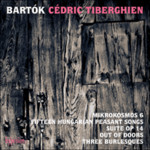
Bartok: Mikrokosmos Book 6 / Out of Doors / etc
 $45.00
Special Order
$45.00
Special Order3 - 6 weeks add to cart
BELA BARTOK
Bartok: Mikrokosmos Book 6 / Out of Doors / etc
Cédric Tiberghien (piano)
[ Hyperion / CD ]
Release Date: Tuesday 1 March 2016
This item is only available to us via Special Order. We should be able to get it to you in 3 - 6 weeks from when you order it.
The remarkably gifted French pianist Cédric Tiberghien turns to the music of Béla Bartók in a wide-ranging programme including the famous Op 14 Suite and the sixth (and final-most ferocious in its technical demands) book of the Mikrokosmos project.
The earliest of the works on this recording, Three Burlesques, was published in 1912, the title betokening the composer's interest in the grotesque. Two alternative titles for the first Burlesque (composed in November 1908) that Bartók had in mind were 'Anger because of an interrupted visit' (to his then pupil Márta Ziegler, who would become his first wife in 1909) and 'Rondoletto à Capriccio'. Notionally in C, it opens with a tetchy one-bar ostinato divided between the hands, which is extended by the addition of a melodic fragment that curves upwards and partially descends. In the middle section, insistent taps in the left hand ironically challenge an expressive waltz-like theme in the right hand, and the opening material is gradually reasserted.
The second Burlesque, subtitled 'A bit drunk' (or 'A little tipsy'), was written in 1911 and demonstrates the ongoing influence of Debussy, whose music he had begun to study in 1907, particularly through its use of parallel chords in the right hand. In the tonality of E, and imbued with the Phrygian mode that Bartók had observed in many folk melodies, it gently intimates a state of inebriation through the use clipped grace notes in the left hand and a wayward tempo.
Debussy's Feux d'artifice may be seen to hover over the dazzling, scherzo-like third Burlesque in E flat. It begins with a daring touch of bitonality, the music in the right hand sitting a semitone above the left hand, high up the keyboard. In the middle part of the movement it settles on an almost machine-like texture, which anticipates later twentieth-century music, including that of Ligeti. The virtuoso concluding section briefly settles on a sharply hued C major before the home tonality, coalescing major and minor modes, is heroically restored.
The Suite, Op 14, in a polymodal B flat, was completed in February 1916, concurrent with the two sets of five songs that hold the following pair of opus numbers. Bartók had been declared unfit for military service in late 1914 and found himself able to return to collecting folk music, the lifeblood of his composition, by the January of the following year. In four movements, though apparently projected to have five (an Andante being rejected), the Suite demonstrates Bartók's considerable musical development since the composition of Three Burlesques. It does not draw on actual traditional music but as in the Burlesques it incorporates aspects of folk style in an entirely original approach.
"Possessing an instinctive feel for impressionism, and for the ebb and flow of those rhythms with their little hesitations and sudden rushes forward, Cédric Tiberghien is ideally fitted for this task…the chief glory of this recording lies in what Tiberghien does with the Peasant Songs and the sixth book of Mikrokosmos. Each of the songs is sharply characterised, and the pulse throughout follows the heartbeat" BBC Music
"one of the most remarkable aspects of Tiberghien's interpretations is that they are refreshingly free of those aggressive arracks that used to pass for 'Bartok style'. He never overplays, yet there's ample dynamic variety, scrupulous attention to articulation and plenty of rhythmic verve…[he] is clearly a committed Bartok player, whose fresh ideas are remarkably consistent with the letter and spirit of the Hungarian master" Gramophone
Tracks:
Mikrokosmos Book VI
Piano Suite, BB 70, Sz. 62, Op. 14
Out of Doors, Sz. 81, BB89
Hungarian Peasant Songs for piano (15), BB 79, Sz. 71
Three Burlesques, Op. 8c, Sz. 47, BB55